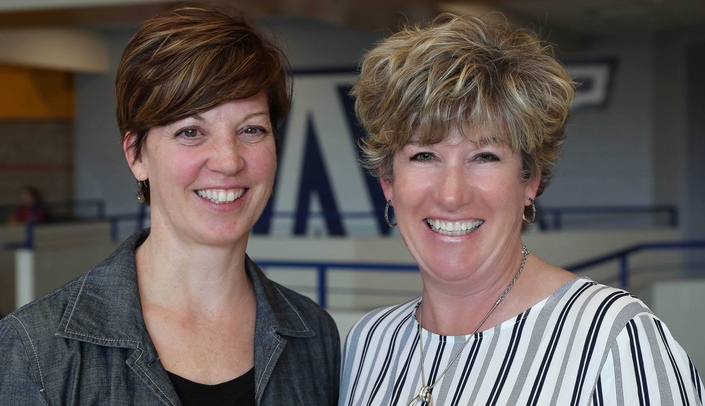Researchers at UNMC and the University of Nebraska at Kearney (UNK) are about to launch a collaboration aimed at reducing childhood obesity in rural communities by making a good thing better.
The five-year, $2.5 million grant from the Centers for Disease Control and Prevention (CDC), was awarded to Jennie Hill, Ph.D., associate professor of epidemiology in UNMC’s College of Public Health, and Kate Heelan, Ph.D, professor of exercise science and director of the Physical Activity and Wellness Lab at UNK. The grant will be split — $1.3 million to UNMC and $1.2 million to UNK.
They plan to repackage an already successful healthy living program called Building Healthy Families, which was developed by Dr. Heelan and her team in 2009, and replicate it in smaller communities across the country. The free, 12-week program is designed for families with children ages 6-12 and teaches them to identify better food choices, modify unhealthy behaviors and increase physical activity.
Data collected during preliminary and follow-up assessments by faculty from UNK’s Department of Kinesiology and Sport Sciences shows the program has been successful in promoting excess weight loss, muscle gain and improved health for both adults and children.
According to the CDC, obesity affects nearly one in five children in the U.S., with higher rates in lower-income families and rural areas that don’t have access to the same resources as urban cities. Effective research-tested, family-based programs have been available for over two decades. However, getting these programs started and sustained in communities has been difficult — particularly for rural areas.
“The funding from CDC is going to help us test ways to involve communities in setting up and sustaining effective childhood obesity treatment programs so that rural areas and small cities across Nebraska and other Great Plains states can benefit,” Dr. Hill said.
Dr. Heelan said, “There are many health risks associated with obesity, and with children we know the risks are even greater in rural communities. This is an area people across the nation are concerned about.
“We’ve demonstrated that if we can intervene at a young age and teach kids and families to make better choices, there can be long-term sustainability and decreased health risks,” she said.
At the conclusion of the five-year project, the program will be ready for adoption by health care, community or public health organizations that serve lower-income or rural populations.

Very exciting! Great work!
Congratulations! Sounds like a wonderful collaborative effort between Nebraska campuses and the community. Well done!
Congratulations Dr. Hill!
This is absolutely amazing!
Congratulations Dr. Hill!!!